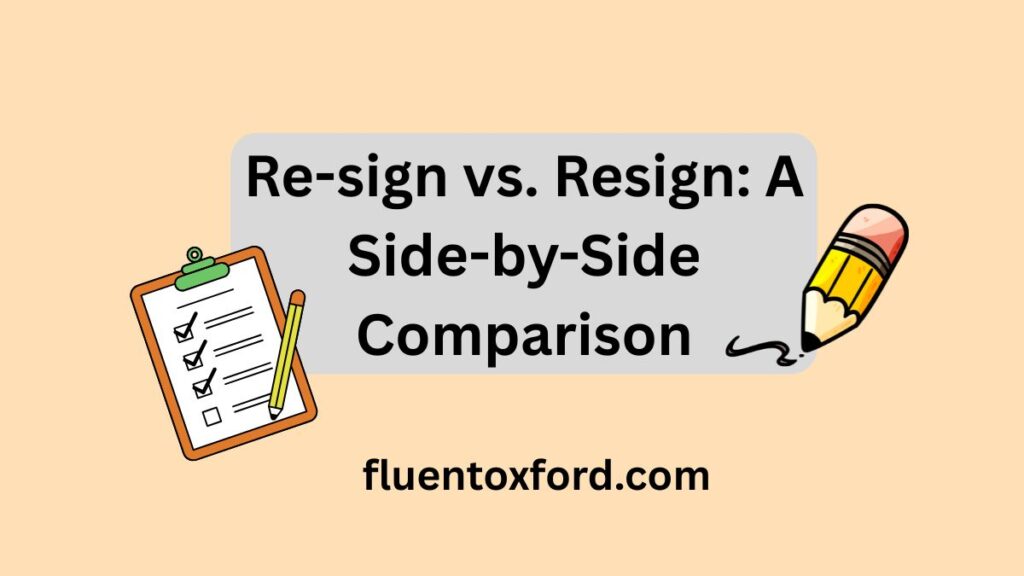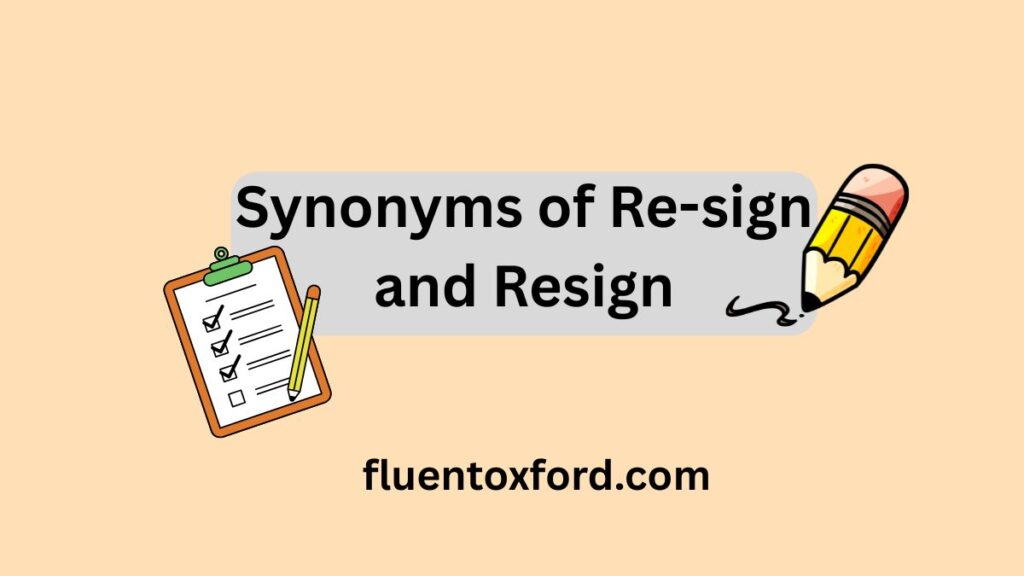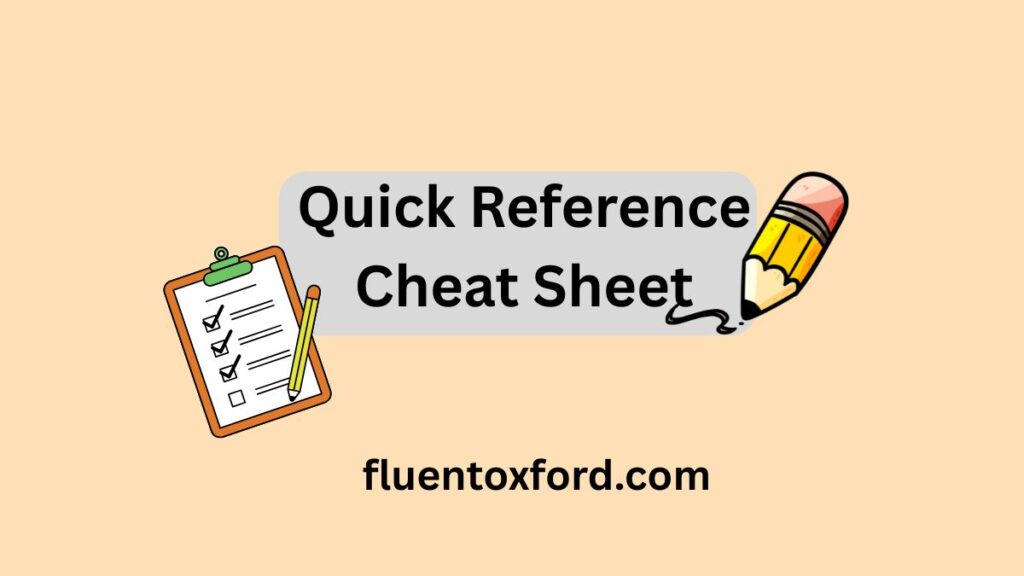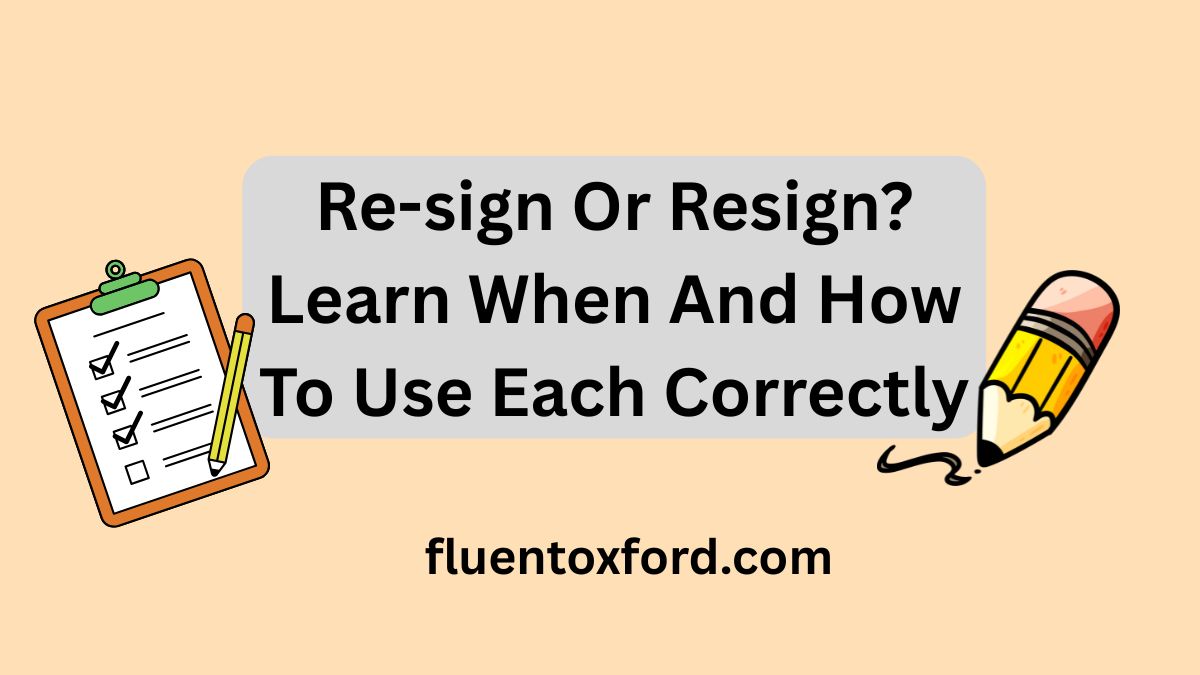“Re-sign or Resign? Learn When and How to Use Each Correctly” highlights the importance of knowing the difference between two similar-looking words with completely different meanings. “Re-sign” means to sign again, often in the context of renewing a contract or extending an agreement. In contrast, “resign” means to step down or quit a job or position. Though they are separated only by a hyphen, their meanings are not alike and can lead to confusion if misused.
One small punctuation mark—a hyphen—can be the difference between staying and leaving. That tiny line can turn a message of commitment into a statement of departure. This kind of mistake can cause serious problems in emails, job contracts, and public announcements. Understanding the power of correct word choice adds clarity and credibility to your writing.
The topic “Re-sign or Resign? Learn When and How to Use” helps improve your communication skills and avoid embarrassing or costly errors. Knowing when and how to use each term makes a big difference in professional and everyday writing. Whether you’re an employee, student, or content creator, mastering “Re-sign or Resign? Learn When and How to Use” will boost your confidence and help you deliver your message clearly.
The Root of the Confusion
Both “re-sign” and “resign” share similar letters and nearly the same spelling, but they’re not interchangeable. What makes them tricky is that the difference often comes down to a single punctuation mark—a hyphen.
Other reasons they’re often confused include
- They both involve formal agreements.
- They can both appear in employment or contract-related contexts.
- They sound similar, especially when spoken quickly.
Even experienced writers and journalists sometimes get them wrong. That’s why learning the difference matters.
What Does “Re-sign” Mean?
“Re-sign” means to sign something again. It’s often used in legal, business, and sports settings to refer to renewing an agreement or extending a contract.
Examples:
- The athlete re-signed with the team for another season.
- I need to re-sign the new lease agreement before Friday.
- They re-signed the document after the revisions were approved.
- You’ll usually see “re-sign” used when:
- A contract is being extended.
- A player is renewing their deal with a team.
- A tenant agrees to stay longer in a rental.
Industries where “re-sign” is common include:
- Real estate and rentals
- Professional sports
- Business contracts and legal documents
- Freelance work and consulting
What Does “Resign” Mean?
“Resign” means to voluntarily leave a job or position. It’s the formal term for quitting or stepping down.
Examples:
- The manager resigned due to personal reasons.
- After five years, she resigned from her role at the company.
- He submitted his resignation yesterday.
This word often appears in:
- Job resignations and career announcements
- Political offices or board positions
- Letters of resignation or exit emails
Common phrases with “resign” include:
- Resign from a job
- Submit a resignation
- Step down from a role
- Resign effective immediately
Re-sign vs. Resign: A Side-by-Side Comparison

Here’s a simple breakdown to help you remember:
Meaning:
- Re-sign: to sign again or renew
- Resign: to quit or leave a position
Spelling:
- Re-sign: includes a hyphen
- Resign: no hyphen
Pronunciation:
- Re-sign: REE-sign (emphasis on “re”)
- Resign: ri-ZINE (emphasis on “sign”)
Example:
- Re-sign: “She re-signed with the company for another year.”
- Resign: “She resigned from her position.”
When to use:
- Re-sign: extending a lease or contract
- Resign: leaving a job or role
Why Hyphenation Matters
The hyphen completely changes the meaning.
Without it, the word “resign” means to quit.
Example:
- “The CEO will resign the contract.” (This makes it sound like the CEO is quitting.)
- “The CEO will re-sign the contract.” (This shows the CEO is renewing the agreement.)
The prefix “re-” usually means “again.” But when it comes before a word like “sign,” it needs a hyphen to keep the meaning clear.
Hyphenation rule: Always use a hyphen when not using one could lead to confusion or misinterpretation.
Pronunciation Guide
These two words are easy to mispronounce if you’re not careful.
- Re-sign: pronounced “REE-sign.” Emphasis on the first syllable.
- Resign: pronounced “ri-ZINE.” Emphasis on the second syllable.
Tip to remember:
If the stress is on “re,” it usually means to sign again.
If the stress is on “sign,” it usually means to quit.
Spelling and Usage Tips
Here are a few quick tricks to avoid mistakes:
- Are you talking about quitting or leaving a job? Use “resign.”
- Are you talking about renewing a contract or agreement? Use “re-sign.”
- If the sentence involves continuing something, go with “re-sign.”
- If someone’s submitting a resignation letter, use “resign.”
Autocorrect often won’t catch this, so always double-check.
Synonyms of Re-sign and Resign

When in doubt, using synonyms can help make your writing clearer.
Synonyms of “Re-sign”:
- Renew—Extend the length of the agreement.
- Extend —Make the contract last more time.
- Recommit —Agree again to the same terms.
- Sign again—write your signature once more.
- Ratify—Formally approve the agreement again.
- Affirm—Confirm continued commitment or support.
- Reauthorize —Give official permission once more.
- Reapprove—Approve the same agreement again.
- Resubscribe—Enroll again for a service.
- Reengage—Start commitment again or continue.
Synonyms of “Resign”:
- Quit—Leave a job or position.
- Step down from—exit a role officially.
- Retire—Leave work, often permanently.
- Withdraw —Remove yourself from a position.
- Relinquish —Give up a held role.
- Depart—Leave a job or office.
- Vacate—Make a position officially empty.
- Abandon—Leave duties or responsibilities behind.
- Give up—surrender a job or title.
- Exit—Leave a role or situation.
These are helpful alternatives, especially in professional writing or news articles where clarity is essential.
Real-Life Examples in Context
Seeing these words in real-life examples can make their meanings stick.
Examples of “re-sign”:
- “The musician re-signed with the label after a successful tour.”
- “We re-signed the agreement after adjusting the payment terms.”
- “The basketball player re-signed with his team through 2026.”
Examples of “resign”:
- “After a conflict of interest, the board member resigned.”
- “She resigned to pursue her own business full time.”
- “The director resigned following an internal investigation.”
In each example, context plays a big role. But the spelling and punctuation make the meaning clear.
Etymology and Word Origins
Understanding where these words come from helps explain why they’re so different.
“Re-sign” comes from Latin roots:
- “Signare” = to sign
- “Re-” = again
- Put together, “re-sign” means to sign again
“Resign” comes from a different Latin word:
- “Resignare” = to unseal, cancel, give up
- It evolved to mean giving up a role or title
Even though they look alike, their origins are distinct. That’s why they have opposite meanings.
Common Mistakes and How to Avoid Them
This mix-up happens even in headlines and emails. One missing hyphen can change the whole story.
Example:
Wrong: “The athlete will resign with the team.”
Right: “The athlete will re-sign with the team.”
Mistake prevention tips:
- Read aloud to check pronunciation and intent
- Use synonyms to test the meaning
- Don’t rely on spellcheck or grammar check alone
- Use a grammar tip sheet or keep a quick-reference table handy
Quick Reference Cheat Sheet

Here’s a simple guide to keep by your desk or in your notes:
Use “re-sign” when:
- Someone is renewing a contract
- You’re continuing a lease or agreement
- You mean “sign again”
Use “resign” when:
- Someone is quitting a job
- You’re referring to a resignation letter
- You mean “step down” or “leave a role”
Case Study: When a Hyphen Made Headlines
In 2023, a major news outlet published a headline that read:
“Star Quarterback to Resign With Team.”
Fans thought he was quitting. In reality, he was staying for another season. The article meant to say he would “re-sign.”
The story was quickly corrected, but the damage was done. A single missing hyphen had confused millions of readers.
Lesson: Hyphens aren’t just grammatical—they’re powerful.
Conclusion
Understanding the difference between “Re-sign or Resign? Learn When and How to Use” is important for clear communication. A small hyphen changes the meaning completely. “Re-sign” means to sign again, like renewing a contract. “Resign” means to leave a job or position. Mixing them up can lead to confusion, especially in work or legal settings. Always look for the hyphen to know the correct meaning.
Using “Re-sign or Resign? Learn When and How to Use” correctly helps you avoid mistakes in writing and speaking. It shows attention to detail and professionalism. Whether you’re writing an email, filling out a form, or speaking in a meeting, choosing the right word matters. This simple rule can save you from big misunderstandings. Keep the meanings clear in your mind, and you’ll use them with confidence every time.
FAQs
FAQ 1: What’s the main difference between “re-sign” and “resign”?
Answer: “Re-sign” (with a hyphen) means to sign something again, like a contract. “Resign” (no hyphen) means to quit a job or position.
Q 2: How do you pronounce “resign” and “re-sign”?
Answer: “Resign” is pronounced ri-ZINE, while “re-sign” is pronounced REE-sign. Stress placement makes all the difference.
Q 3: Is “re-sign” used in legal or professional documents?
Answer: Yes. “Re-sign” is commonly used in sports contracts, lease renewals, and corporate agreements where someone signs again.
Q 4: Can a typo between “resign” and “re-sign” cause problems?
Answer: Absolutely. In emails or headlines, it can lead to serious miscommunication—like falsely implying someone is quitting.
Q 5: Is the hyphen in “re-sign” always required?
Answer: Yes, when the meaning is “sign again,” the hyphen is essential to distinguish it from “resign,” which means to quit.

As an admin at Fluent Oxford, Maida Queen is the driving force behind our vibrant learning community. With a deep passion for English language education, she ensures that our platform remains a dynamic, engaging, and supportive space for learners worldwide.
Maida expertly manages content, assists users with their grammar and fluency queries, and fosters an interactive environment where learning feels effortless and enjoyable. Whether you need guidance, motivation, or just a friendly face in the Fluent Oxford community, Maida is always there to help you reach your English language goals.








